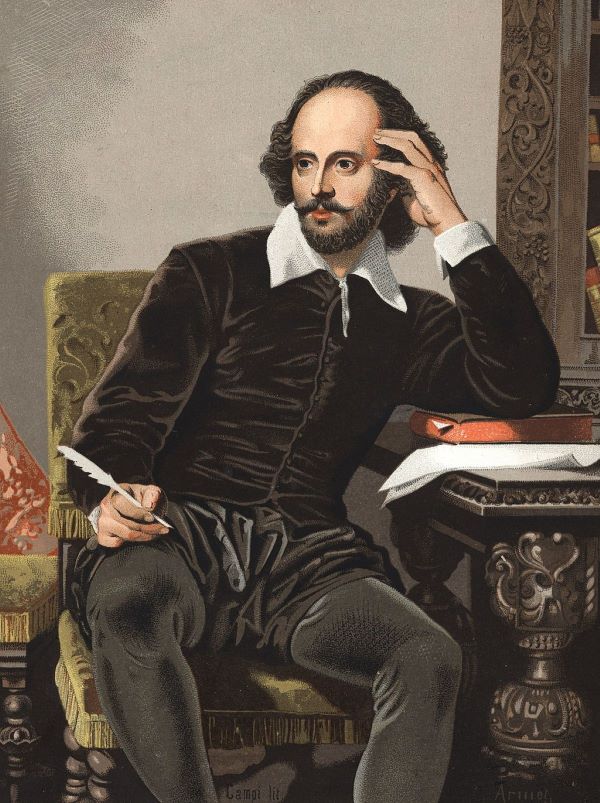Liberty Matters
Renouncing Power

I will use this response to try to redirect our conversation more explicitly back to matters of power and corruption in Shakespeare's plays. Sarah Skwire is skeptical regarding Ariel being a "messenger of Christian grace," and I am happy to agree to disagree; I will argue, however, that my theological interpretation of Ariel -- whose name means "Lion of God" and can be connected to the symbol of the tribe of Judah[43] -- well demonstrates his role as one who encourages his listeners to throw off the corrupting chains of ill-gained and ill-exercised power. Note that in Act III, scene iii, when Ariel confronts the "three men of sin" (53)--Alonso, Antonio, and Sebastian--he specifically tells them that "I and my fellows / Are ministers of fate," telling them that "The powers, delaying, not forgetting, have / Have incensed the seas and shores, yea, all the creatures, / Against your peace"; regarding Ariel's confrontation, Prospero says, "a grace it had devouring" (60-61; 73-75; 84, italics mine). Ariel's confrontation effects the conviction of sin all three men experience, the working of, in Gonzolo's words, "Their great guilt" (105). Alonso soon responds to his conviction of sin by repenting before Prospero, renouncing power gained through corrupt means. He tells Prospero, "Thy dukedom I resign, and do entreat / Thou pardon my wrongs" and humbly asks Miranda for "forgiveness" (V.i.118-19; 200). Similarly, Ariel's previously discussed exhortation that Prospero pity his captives inspires Prospero to renounce the corruption of seeking revenge and cast off his corrupting absolute power over the island and its inhabitants. (The Tempest, V.i.16-57). I have already discussed the theological underpinnings of Caliban's repentance and Prospero's Epilogue.[44] That Shakespeare utilizes the theologically mysterious figure of Ariel[45] as an instrument of grace and couches his ultimately Christian message of repentance and forgiveness within a pagan setting and more ambiguous spiritual diction (e.g., "fate," "powers") is unsurprising considering that The Tempest was written under the constraints of the 1606 Act to Restrain the Abuses of Players, which curtailed references to God or the Trinity on the stage.[46] But for our forum's purposes, we may recognize that Shakespeare uses Ariel to convict characters of corruption, the renunciation of which coincides with renouncing corrupt power, even absolute power.
We should also consider, within the broader context of Shakespeare's plays, Ariel's role as Prospero's wisdom-giving counselor. Indeed, Prospero's decision to receive wise counsel and voluntarily renounce absolute power and its attendant corruption appears unique among Shakespeare's rulers. Conversely, various of Shakespeare's rulers demonstrate their corruption by rejecting wise counsel. In Measure for Measure, Angelo, to whom the absent Duke gave absolute power over Vienna, self-righteously rejects Escalus's advice to show mercy to Claudio (Measure for Measure II.i.1-31); but soon after Angelo becomes enamored with Claudio's sister, the novice Isabella, and contrives to violate her. (Measure for Measure II.ii.169-94; II.iv.142-71). In Coriolanus, Coriolanus's downfall begins when he arrogantly disregards Volumina's, Cominius's, and Menenius's exhortations that he speak humbly to the plebeians. (Coriolanus III.ii and III.iii). And Julius Caesar's disregard of the Soothsayer's warnings to beware the ides of March (Julius Caesar I.ii.15-24) demonstrates the prideful self-sufficiency that propels his drive for absolute power and inspires his subsequent assassination. Significantly, King Lear explicitly rejects Kent's wise counsel in favor of Goneril's and Regan's flattery (King Lear I.i.118-77), a peevish response that demonstrates the corruption of Lear's absolute power even as he foolishly seeks to cast off power's responsibility. Lear's folly exhibits the corrupting influence of flattery, which, in its deception, appears to reinforce the ruler's problematic exercise of power instead of wisely challenging it, a deception that Lear embraces at the cost of his own and others' lives. Lear's tragic outcome illustrates the deadly nature of flattery and instructs readers as to why Dante gave a special place in Hell for the flatterers (Inferno, canto 18.115-36) and why the mild Erasmus not only exhorts rulers to avoid flatterers but even advocates their execution.[47]
But I argue that Henry V is the Shakespearean character with the most complicated relationship with counselors. As I noted earlier, Henry's dubious decision to invade France is inspired by the counsel of both his dying father and the Archbishop of Canterbury. (Henry IV, Part 2 IV.v.213-14 and Henry V I.ii.9-221). As I hope to discuss in a final post, Henry's decision to follow such counsel is, albeit successful in securing and expanding Henry's power, both problematically Machiavellian and morally corrupting.
Endnotes
[43.] Herbert Marks, ed., The English Bible: King James Version. Vol. 1: The Old Testament. A Norton Critical Edition (New York: Norton, 2012), notes on Isaiah 29:1. Significantly, Jesus descends from the tribe of Judah and is called "the Lion of the tribe of Judah" (Revelation 5:5, KJV).
[44.] See my post "Power and Corruption in Shakespeare's Plays," par. 11.
[45.] W. Stacy Johnson, "The Genesis of Ariel," Shakespeare Quarterly 2.3 (1951): 205-10.
[46.] Hugh Gazzard, "An Act to Restrain Abuses of Players (1606)," Review of English Studies 61.251 (2010): 495-528.
[47.] See Erasmus, The Education of a Christian Prince, trans. Neil M. Cheshire and Michael J. Heath, ed. Lisa Jaradine (Cambridge: Cambridge University Press, 1997), 54-61.
Copyright and Fair Use Statement
“Liberty Matters” is the copyright of Liberty Fund, Inc. This material is put on line to further the educational goals of Liberty Fund, Inc. These essays and responses may be quoted and otherwise used under “fair use” provisions for educational and academic purposes. To reprint these essays in course booklets requires the prior permission of Liberty Fund, Inc. Please contact oll@libertyfund.org if you have any questions.